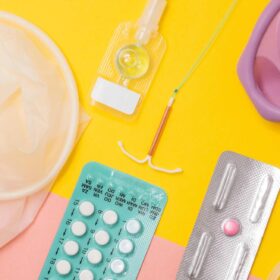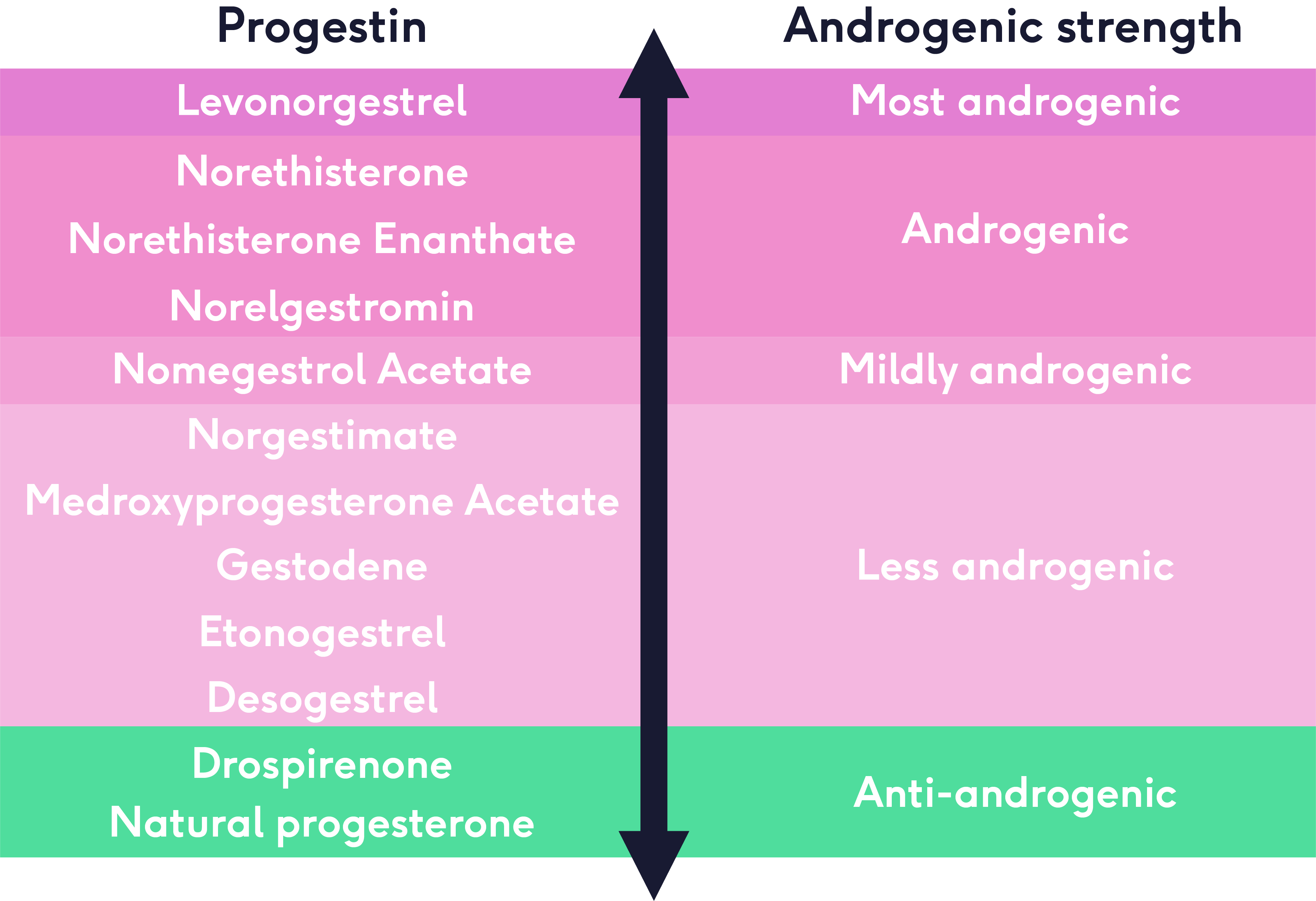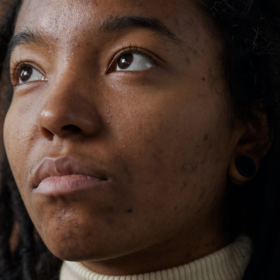
What’s the best contraceptive pill for acne?

This guide has been peer reviewed by the medical team at The Lowdown and the FSRH and is regularly reviewed as per both clinical content policies
In this article
What's the lowdown?
Your contraception can affect your skin – sometimes in a good way
Combined hormonal contraception (containing oestrogen and progestogen) generally improves acne, while progestogen-only birth control sometimes leads to acne spots
Generally the best contraceptive pill for acne is the combined pill, which includes popular brands such as Yasmin, Eloine and Lucette
But it’s not always as simple as that – take a look at our reviews to see how different contraceptives affect people’s skin
Annoyingly, women are more likely than men to be affected by acne in adulthood,¹ suggesting hormones may play a key role. It’s perhaps not surprising that many women find changing their birth control affects their skin. In this article, we look at the contraceptive methods – such as the pill, patch or copper coil – that can help or hinder your efforts to bust blemishes.
What is acne?
Acne is a really common skin condition – but that doesn’t mean it’s not distressing. It causes black, white or red spots to appear on the face. Some people get acne on their back or their chest too.
While it’s true that acne is most common in young people (around 8 in 10 teenagers develop it at some point),² it can affect older people too.
There are loads of myths about what causes spots. Some people think it’s to do with eating certain foods (such as chocolate or fizzy drinks) or poor hygiene, but this is generally not supported by evidence. Specific diets aren’t recommended to treat acne but a healthy balanced diet is likely to be best for your skin.³ Avoiding oil based products and removing makeup at the end of every day is likely to help too.³ However the best explanation for acne is hormonal changes and that’s why it tends to flare up during and after the already rocky ride that is puberty.
How do hormones affect our skin?
Our skin glands are really sensitive to hormones called androgens. Androgens are sometimes called male hormones, but both men and women produce them. Learn more in our androgens blog. Androgens cause glands in your skin to produce excess amounts of oil (called sebum) and also thicken hair follicles, causing pores in the skin to block. Excess sebum interacts with usually harmless bacteria on the skin, causing spots.
Acne is also a common symptom of polycystic ovary syndrome (PCOS) – a condition where the ovaries produce more androgens and that can also cause irregular periods and excessive unwanted hair.⁴ See our webinar on PCOS and chat to your GP if the symptoms sound familiar.
Oestrogen, one of the main hormones involved in the menstrual cycle, has the opposite effect on sebum production. Experts think oestrogen reduces sebum by preventing the ovaries from making androgens. Noticed you’re more prone to spots at certain times of the month? You’re not alone. Your menstrual cycle can have a profound effect on your skin. This might explain why some women experience acne just before their period when oestrogen levels drop.
Progesterone is the other main hormone involved in the menstrual cycle. It is not yet clear how progesterone affects acne. But some studies and anecdotal evidence suggest it can make skin problems worse.
Hormonal contraception therefore might affect your skin. The general rule is that ‘combined’ methods containing both oestrogen and progestin (a synthetic form of progesterone) can improve acne, while progestogen-only contraception might lead to spots or worsen acne in some people.
But remember, it’s not a one-size-fits-all thing. As you’ll see from our user-generated reviews, some people find their contraception gives them a clearer complexion, while others find the same method makes things worse!
What’s the best combined pill for acne?
The good news is that people who take the combined pill often see an improvement when it comes to acne. Some people are actually prescribed the combined pill to clear up their skin even if they don’t need contraception.
Studies show that women with acne who take the combined pill tend to see an improvement in the number of spots and the severity of their acne compared to individuals who aren’t on hormonal contraception.⁵ ⁶
However it can take a few months of use to see a noticeable improvement in your skin after you start taking the combined pill. Some people even find their skin gets worse in the first 2-3 weeks after they start taking a new combined pill, but this usually settles down and the best skin results are seen at around 3 months.
You can use our contraception recommender tool, to help guide you to the best contraceptive for you.

Anti-androgen pills such as Yasmin for acne
There’s not a tonne of research on which brands of the combined pill are most likely to improve acne, but scientists think the type of progestogen it contains might make a difference. One study⁷ found pills that containing a progestogen called drospirenone are the most helpful for preventing acne. It also concluded that pills containing levonorgestrel and norethindrone (also called norethisterone) were the least helpful.
Pill brands containing drospirenone include Yasmin, Eloine and Lucette. Drospirenone is known as an anti-androgen because it reduces the effect of male hormones such as testosterone.

You can view more information about the different brands of pills on our products pages, such as Yasmin side effects here.
Should I take Dianette for acne?
You might have heard that the pill Dianette can help treat acne. This pill contains a progestogen called cyproterone acetate, which like drospirenone, can block the effects of androgens. Dianette used to be licensed as contraception in the UK, but the rare risk of developing blood clots in the legs or lungs with Dianette is higher than other contraceptive pills. For this reason, Dianette is no longer prescribed purely for contraceptive reasons.⁸
Doctors will sometimes prescribe Dianette for treating moderate to severe acne and excess facial or body hair in young women, often when other treatment options have failed. Dianette provides contraception in women who require it to treat these conditions, but it will not be prescribed purely as a contraceptive.⁸ You can see reviews for Dianette here.
Will the patch or ring affect my skin?
The contraceptive patch (such as Evra) and the vaginal ring (NuvaRing) prevent pregnancy by releasing small amounts of both progesterone and oestrogen into the body. Like the combined pill, these contraceptive methods may improve acne for some women.
One study⁹ found women who used the vaginal ring even experienced less acne than women taking a combined pill. But more research is needed on the impact of these forms of contraception on the skin.
Does the progestogen-only pill cause acne?
Popular brands of progestogen-only pills (also called the mini-pill) include Cerazette, Cerelle and the Hana contraceptive pill. This type of contraception doesn’t contain any oestrogen.
Some women find the mini-pill has lots of advantages – particularly if they experienced side effects or can no longer take the combined pill. But unfortunately, progestogen-only pills haven’t been found to improve acne. The very limited research evidence means an association between the progestogen-only pill and acne can’t be confirmed, however we know some women find taking the mini-pill makes their skin worse or triggers acne.¹⁰ This could be because the synthetic progestin in the mini pill may bind to androgen receptors in the body to cause your skin to produce more pore-clogging sebum.
Research is similar for women who take the contraceptive injection or implant, which are also progestogen only contraceptive methods, with some users reporting worsening acne.¹¹ ¹²
Which progestogen-only pill is best for acne?
A new type of progestogen-only pill called Slynd contains drospirenone. This is an anti-androgenic progestogen and may help improve acne for women who cannot use oestrogen in combined hormonal contraception.
Will the hormonal coil affect my skin?
The hormonal coil (also know as the hormonal IUD or IUS), which includes brands such as the Mirena coil, slowly releases the progestogen levonorgestrel into your womb to prevent pregnancy. This method of contraception does not contain oestrogen. It’s great if you don’t want to have to think about contraception every day or every time you have sex and lasts for 6 years. The research is too limited to establish if acne is caused by the coil, however some women find they experience more acne after having a hormonal coil inserted, although this is likely to decrease with time.¹³ The amount of progestogen in the coil is much lower than that found in other progestogen only contraceptives like the mini pill, so theoretically there may be less of a noticeable impact on the skin although this hasn’t been proven in research.
Non-hormonal contraceptives and acne
If you’ve sworn off hormonal contraceptives, rest assured that hormone-free methods such as the copper coil, condoms, or using an app like Natural Cycles, should not worsen acne in theory.
However, if you’ve switched from a combined hormonal contraceptive (like the pill, the patch or vaginal ring) to a hormone-free option, you may notice new or worsen acne. That’s because the combined contraception you were previously taking may have been helping to keep breakouts at bay.
Other treatments for acne besides contraception
If you’ve tried combined contraception containing both oestrogen and progestogen and found it doesn’t help your acne – or you can’t take the combined pill, patch or ring – speak to your GP to find out about other acne treatments that might help. Possible options include creams containing ingredients like benzoyl peroxide or retinoids. They might even recommend an antibacterial cream – or antibiotic tablets.
Don’t suffer in silence. Acne sucks, but there are plenty of effective treatment options. Your pharmacist or GP should be able to help find the best one for you.
This blog can help you learn more about various contraception options, but it does not give medical advice. You should always speak to a nurse or doctor when making choices about contraception and before starting a new method.
Our medical review process
This article has been medically reviewed for factual and up to date information by a Lowdown doctor.

